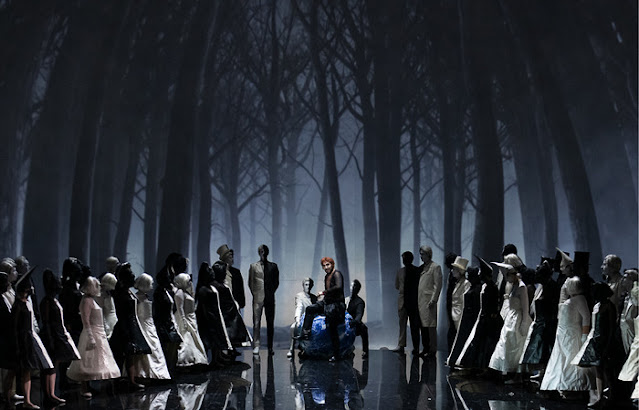Capitole de Toulouse, 27/06/2023
Boito : Mefistofele
Chœur et Maîtrise de l'Opéra national du Capitole
Orchestre national du Capitole
Francesco Angelico
This production originated in Monte-Carlo in 2011, before being shown in the Roman Theatre in Orange in 2018, where I saw it. However, the requirements of a proscenium-arch indoor theatre - especially the smaller ones, like Monte-Carlo and Toulouse - and of an 8,000-seat open-air arena are clearly very, very different, and I'm not really inclined to compare them. Apart from one or two minor details, this was a very different show.
Technically speaking, it's pretty much a virtual production, something I think necessary to pack onto the stage the substantial chorus required for many of the scenes. The setting was curved wall, a bit like the inside of an eggshell with the cap off, and on that wall, Arnaud Pottier's inventive videos were projected to create all the necessary scenes. These went from drifting clouds hinting at rising tiers of angelic choirs, to a verdant garden that gradually gets blasted by winter as Marguerite succumbs to Faust's seduction, to an observatory interior for Faust's study, to an ashen forest for the Brocken Sabbath, and so on. It was all extremely well conceived.
 |
| Boito : Mefistofele - Act 2, scene 2, the Witches' Sabbath Nicolas Courjal (Mefistofele), centre, Chorus of the Capitole National Opera © Mirco Magliocca (2023) |
Dress, on the other hand, was a bit all over the place. Mefistofeles was in classic garb, doublet and hose, feathered hat and cape, straight out of the story books. The first scene of Act 1 was surely set on Mardi Gras rather than Easter Sunday, so costume there was very motley. The men, including Faust and Wagner, mostly wore suits, somewhat Edwardian in appearance, but the women were harder to define, and Margarita and Marta were definitely later 20th Century. The Classical Sabbath was again straight out of story books. However, as in Orange, the overall effect was to make it timeless, which seems suitable for such a seminal text as Faust.
Much of the cast was the same as in Orange. Jean-François Borras brought a ringingly bright voice to the role of Faust, but was also capable of great subtlety of vocal colour when he chose. There were a couple of spots where he struggled against the combined forces of chorus and orchestra in climaxes, but this was true of everyone at some point or other. Béatrice Uria-Monzon had made the wise decision not to reprise Margarita, but to keep Elena, to which she had been much better suited in Orange, and which again proved to be a good fit for her dramatic, vibrato-heavy voice. Marie-Ange Todorovich, on the other hand, did not weather the years so well, or rather her character didn't, this Marta wasn't nearly the fun cougar she had been in Orange, but a much more pathetic creature, and Todorovich lost a bit of her spark, and sounded somewhat hooting.
The first major change was Italian soprano Chiara Isotton taking up Margarita. Oddly enough, she was at her least convincing in her aria, "L'altra notte", because she was over-dramatising it; it's most effective when sung very simply and forlornly, and Isotton was practically chewing the scenery. In addition, she appears to lack a convincing trill, which rather sticks out in this aria. On the other hand, in ensemble, she was very good, and especially in the "Lontano, lontano" Prison Duet with Borras, which was a miracle of hushed beauty from both of them.
The second change, and the most important, was in the title role. At Orange, I had said I didn't feel that Erwin Schrott was a true bass; Nicolas Courjal is, with a much darker tone, and that biting quality of timbre you hear in all the best devils. His Italian had a bit of a French accent, but was very clear - the quality of diction all around was excellent, in fact, including in the chorus - and he was playing his part with evident relish, mercurial and beguiling, a proper devil, rather than the flashy con-artist of the Orange production.
There was only one chorus here, rather than the three required for the open-air performance, and they weren't absolutely perfect. There are a few really tricky corners, which were slightly scuffed, but then so was the orchestra at the same spots. However, in the main, they came through splendidly, the glorious "Ave Signor" of the Prologue and Epilogue pinning the audience back in their seats with the blaze of sound, and earning a well-deserved ovation at the end. The orchestra played well, though without the level of detail that can be achieved, but the support for the vocal plateau was solid, and produced the right effects overall, and I count myself fortunate to have seen two fine performances of an opera that is all too-rarely performed.
[Next : 20th October, or maybe the 7th October first)
